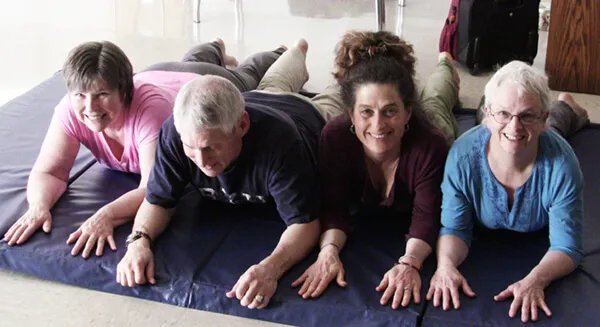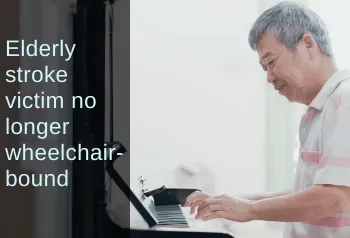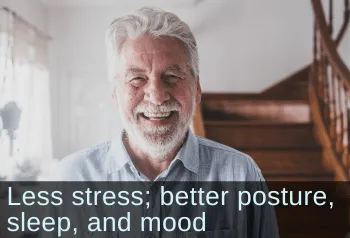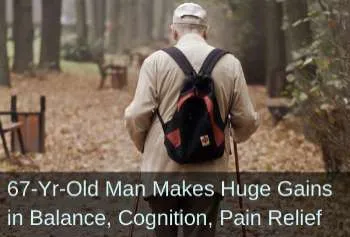Geriatric Issues & Elderly Concerns
Primitive Reflexes and Elderly Concerns
by Sonia Story, M.S.
Can primitive reflex integration and innate rhythmic movements help with the physical and cognitive challenges that many elderly individuals experience?
Research and clinical experience suggests the answer is Yes!
 Unintegrated Primitive Reflexes Are Associated with Dysfunction in the Elderly
Unintegrated Primitive Reflexes Are Associated with Dysfunction in the Elderly
Decades of research has shown a strong association between retained primitive reflexes and dysfunction in geriatric populations. This association is so reliable that researchers advocate for using primitive reflex assessment as a simple, convenient, low-cost method for early detection of cognitive decline (Altunkalem Seydi et al., 2024) and Alzheimer’s disease (Gabelle et al., 2016).
Conditions associated with unintegrated primitive reflexes in the elderly include:
- Cognitive impairment (Damasceno et al., 2005)
- Dementia (Altunkalem Seydi et al., 2024)
- Alzheimer’s disease (Gabelle et al., 2016)
- Parkinson’s disease (Links et al., 2010)
- Stroke (Rao et al., 1999)
- Poor mental health and well-being (Stephens-Sarlós et al., 2024)
- Poor verbal fluency (Rao et al., 1999)
- Depressive disorders (Rao et al., 1999)
- Schizophrenia (Youssef & Waddington, 1988)
- Bipolar affective disorder (Youssef & Waddington, 1988)
Poorly developed postural reflexes, a type of neurodevelopmental movement that first emerges in infancy and ideally remains intact for life, and unintegrated primitive reflexes are part of the clinical features used to describe Parkinson’s disease (Jankovic, 2008). Unintegrated primitive reflexes involving facial and oral muscles appear to be associated with poor eating function, risk of malnutrition, and risk of developing aspiration pneumonia in the elderly (Hobo et al., 2014). Studies have also shown that the higher the incidence of unintegrated primitive reflexes, the greater the extent of brain dysfunction in elderly individuals (Damasceno et al., 2005).
How Neurodevelopmental Movements Can Help with Elderly Issues
Researchers do not always know what causes unintegrated primitive reflexes in the elderly. However, there is promising evidence showing that neurodevelopmental movements may be especially beneficial for elders with challenges.
For example, physiotherapists stated they found primitive reflex integration to be useful in rehabilitation for adults in many areas such as: cognitive issues, motor challenges, fatigue, anxiety, and persistent pain (Ikäheimonen & Petäistö, 2025). These physiotherapists reported associated benefits of primitive reflex integration for adults in the areas of sensory integration, nervous system regulation, musculo-skeletal symptoms, and emotional improvements; resolution of back pain was the most common individual benefit they reported (Ikäheimonen & Petäistö, 2025). Read more to see inspiring results and supportive research showing how neurodevelopmental movements can address challenges in adults.
Improved Cognition and Well-being
Stephens-Sarlós et al., (2024) studied a group of older adult individuals, some of whom participated in sensory-motor activities to reduce the level of unintegrated primitive reflexes. They found that as primitive reflexes were integrated in the experimental group, cognitive function increased and well being was significantly greater than in the control group.
Innate rhythmic movements are a type of neurodevelopmental movement that may be especially helpful for elderly concerns. Research shows that rhythmic input can help the brain to function better (Barnhill, 2013; Thaut et al., 1999). Lisa L., a student of the Brain and Sensory Foundations training, reported that her elderly father—who had been showing signs of early dementia—had a Luminosity [brain training] game score that had plateaued for several weeks at 600 points. After one week of doing daily innate rhythmic movements, her dad’s score increased to over 4000 points.
Stroke Rehabilitation
 Therapists working with the aging population have found neurodevelopmental movements helpful for individuals recovering from stroke. For example, an 86-year-old stroke survivor who had shown minimal progress after five months of traditional rehabilitation, made significant improvements once his OT introduced innate rhythmic movements and primitive reflex integration from the Brain and Sensory Foundations course into his therapy. Within 2.5 months, the man regained the ability to bend at the waist, stand with minimal assistance, feed himself, walk with support, and even play the piano again—an outcome the OT described as one of the most remarkable recoveries he had seen in his 30-year career.
Therapists working with the aging population have found neurodevelopmental movements helpful for individuals recovering from stroke. For example, an 86-year-old stroke survivor who had shown minimal progress after five months of traditional rehabilitation, made significant improvements once his OT introduced innate rhythmic movements and primitive reflex integration from the Brain and Sensory Foundations course into his therapy. Within 2.5 months, the man regained the ability to bend at the waist, stand with minimal assistance, feed himself, walk with support, and even play the piano again—an outcome the OT described as one of the most remarkable recoveries he had seen in his 30-year career.
Another client of this same therapist—a 70-year-old stroke survivor who could not raise his arm without pain—also made tremendous progress. After only 10 minutes of movements aimed at integrating his Asymmetrical Tonic Neck Reflex (ATNR), the client was able to stand up and raise his right arm to full range of motion with zero pain. Read more about both clients' remarkable improvements.
Susan Phariss uses innate rhythmic movements and reflex integration tools in her work at Brain Fitness Strategies. Phariss reported on her outstanding results with a 73-year-old male stroke victim:
“He had been through about 4 years of traditional therapy and had regained nothing. When we started with him, he had no access to his vocabulary except for a nonsensical default word, which he used regularly. He was constantly fatigued, no stamina, spent the day in bed, and was unable to do anything around the house. He fell asleep in the middle of talking with him and couldn’t stay focused…We’ve worked with him twice a month for a year now. Within the first week, his wife noticed he was more alert. He now speaks in complete sentences, but still uses his default word daily. He stands erectly, gets out of bed daily, has started doing chores around the house, has started asking to go places with his wife, chokes on his food less often, is alert, has a funny sense of humor, and is reconnected with his wife. Everyone around him has noticed a significant improvement in all of his functions…”
Researchers Hong and Kim (2016) found that rhythmically-timed movements helped elderly individuals with stroke improve basic mobility and walking gait more efficiently than non-rhythmic exercises done by a control group.
Parkinson’s Disease
In his training course, Dr. Blomberg shared his experiences treating clients with Parkinson’s. He saw that by giving these individuals “movements for integration of primitive reflexes and training [development] of postural reflexes, motor abilities improve and the long time impairment of motor ability that usually happens in Parkinson’s will not take place” (Blomberg & Dempsey, 2006).
I worked with Joyce M., a 73-year-old woman with Parkinson’s disease who was limited to a bed, wheelchair, and walker. After six weeks of a rigorous, daily movement program using a combination of tools from the Brain and Sensory Foundations training, Joyce was walking on her own, without the use of the walker. Here is what Joyce wrote about her experience:
“I have Parkinson’s disease and scoliosis. I suffered from depression and anxiety too. Sonia worked with me using Brain Gym, Rhythmic Movements and Reflex Integration. This helped my eye-hand coordination. The movements helped strengthen my legs and my core balance. My whole quality of life has improved. I have a positive attitude and I feel more engaged with life. I felt so good one day after a session with Sonia that I got back into playing the piano.”
Another striking report comes from Linda Vettrus about her 78-year-old uncle, who suffered from Parkinson’s and severe immobility:
“My 78 year old uncle was profoundly affected in a very positive way by using Rhythmic Movement Training (RMT). He suffered from Parkinson's Disease and was rapidly declining. He was losing his ability to get his legs into a car and was using a walker, even in the house. After 3-4 months of RMT, he was riding in cars and getting in and out without assistance. He not only stopped using the walker, but was able to climb stairs. RMT drastically improved the quality of his life and gave him the independence we so easily take for granted.”
Research studies show that rhythmic input helps improve walking gait in individuals with Parkinson’s disease (Rochester et al., 2009; McIntosh et al., 1997).
Less Pain and Anxiety, Better Focus with Neurodevelopmental Movements
Rhythmic movements and primitive reflex integration can ease physical pain, calm anxiety, and support steadier balance and posture in seniors by helping the nervous system settle and function more efficiently. The following case studies show how these gentle neurodevelopmental techniques have improved sleep, mobility, focus, and overall comfort for older adults—and even for the therapists who use them.

A 60-year-old OT uses primitive reflex integration and rhythmic movements to reduce anxiety and pain, and to improve posture and sleep. Read the full case study here.
Neurodevelopmental movements help an occupational therapist address her own anxiety and improve focus, posture, sleep, and communication. Read the full case study here.
After the use of rhythmic movements and primitive reflex integration from the Brain and Sensory Foundations program, this 67-year-old man reported reduced pain, more comfort, better balance, better walking gait, and more range of motion in his neck muscles. Read the full case study here.
Improved Sleep
Individuals of all ages report better sleep after doing innate rhythmic movements. The 80-year-old friend of Kimberly M. slept much better after using innate rhythmic movements. After only a week of doing the innate rhythmic movements, she reported: “For the first time in 20 years, he was able to sleep for a stretch of 5 to 6 hours, sometimes longer, for several nights in a row.”
Importance of Mobility and Movement Throughout the Life Span
Movement is important for all human beings and elders especially need to move for their well-being. Physical activity improves brain function for elderly individuals (Buchman et al., 2019). And elderly individuals themselves rank mobility as the most important factor in their perceived health and well-being (Andersen et al., 2007). In a meta-analysis, researchers found that physical activity appeared to be an essential part of all interventions to address cognitive frailty in the elderly (Tam et al., 2022). In Brain Rules, Medina (2008) cites research stating that movement and exercise are important to our physical and cognitive well-being throughout the life span.
But in order to engage in comfortable, efficient, and sustainable physical activity in the first place, a full repertoire of neurodevelopmental movements are necessary during infancy. These innate movements of infancy are required to properly develop our postural control, balance, stamina, strength, alignment, and coordination for successful movement as we grow and get older. So if a baby does not receive enough of these movements in early infancy, or if there are challenges in infancy or later life—injuries, illnesses, surgeries, traumas—this innate system of movements can be hindered. When this happens many infant movements, such as primitive reflexes, do not fully develop and integrate; and, they can reemerge or become re-activated later in life when they should be dormant (Melillo et al., 2022; McGlown, 1990).
Conclusion
From the research and clinical observations discussed here, it appears that rhythmic movements and primitive reflex integration movements can improve physical and cognitive functioning in the elderly while promoting feelings of well-being. The profound positive changes reported for elderly individuals are even more remarkable when we consider that the elderly show lower neuroplasticity than children and younger individuals (Stephens-Sarlós et al., 2024). More research into the effects of neurodevelopmental and sensory-motor tools for the elderly is warranted. Neurodevelopments appear to bring powerful physical, social-emotional, and cognitive benefits as well as improved quality of life for elderly individuals.
References
Altunkalem Seydi, K., Kaya, D., Yavuz, I., Ontan, M. S., Dost, F. S., & Isik, A. T. (2024). Primitive reflexes and dementia in older adults: a meta‐analysis of observational and cohort studies. Psychogeriatrics, 24(3), 688-700.
Andersen, D. A., Roos, B. A., Stanziano, D. C., Gonzalez, N. M., & Signorile, J. F. (2007). Walker use, but not falls, is associated with lower physical functioning and health of residents in an assisted-living environment. Clinical Interventions in Aging, 2(1), 123-137.
Barnhill, E. (2013). Neural connectivity, music, and movement: A response to Pat Amos. Frontiers in Integrative Neuroscience, 7, 29.
Blomberg, H & Dempsey, M. (2006). Rhythmic movement training, Level one, 27-28.
Buchman, A. S., Yu, L., Wilson, R. S., Lim, A., Dawe, R. J., Gaiteri, C., Leurgans, S. E., Schneider, J. A., & Bennett, D. A. (2019). Physical activity, common brain pathologies, and cognition in community-dwelling older adults. Neurology, 92(8), e811–e822.
Damasceno, A., Delicio, A. M., Mazo, D. F., Zullo, J. F., Scherer, P., TY Ng, R., & Damasceno, B. P. (2005). Primitive reflexes and cognitive function. Arquivos de Neuro-Psiquiatria, 63, 577-582.
Gabelle, A., Gutierrez, L. A., Dartigues, J. F., Ritchie, K., Touchon, J., & Berr, C. (2016). Palmomental reflex a relevant sign in early Alzheimer’s disease diagnosis?. Journal of Alzheimer's Disease, 49(4), 1135-1141.
Hobo, K., Kawase, J., Tamura, F., Groher, M., Kikutani, T., & Sunakawa, H. (2014). Effects of the reappearance of primitive reflexes on eating function and prognosis. Geriatrics & Gerontology International, 14(1), 190-197.
Hong, H. J., & Kim, Y. M. (2016). Effect of rhythmic movement program to improve walking ability for elderly patients with stroke. Indian Journal of Science and Technology, 9(26), 1-6.
Ikäheimonen, R. M., & Petäistö, J. (2025). Primitiivirefleksityöskentely aikuisilla neuromotorisissa haasteissa: fysioterapeuttien kokemuksia primitiivirefleksityöskentelystä.
Jankovic, J. (2008). Parkinson’s disease: clinical features and diagnosis. Journal of Neurology, Neurosurgery & Psychiatry, 79(4), 368-376.
Links, K. A., Merims, D., Binns, M. A., Freedman, M., & Chow, T. W. (2010). Prevalence of primitive reflexes and Parkinsonian signs in dementia. Canadian Journal of Neurological Sciences, 37(5), 601-607.
McGlown, D. J. (1990). Developmental reflexive rehabilitation. Taylor & Francis. pp.121-122.
McIntosh, G. C., Brown, S. H., Rice, R. R., & Thaut, M. H. (1997). Rhythmic auditory-motor facilitation of gait patterns in patients with Parkinson's disease. Journal of Neurology, Neurosurgery & Psychiatry, 62(1), 22-26.
Medina, J. (2008). Brain rules: 12 principles for surviving and thriving at work, home, and school. Pear Press.
Melillo, R., Leisman, G., Machado, C., Machado-Ferrer, Y., Chinchilla-Acosta, M., Kamgang, S., Melillo, T. and Carmeli, E., (2022). Retained primitive reflexes and potential for intervention in autistic spectrum disorders. Frontiers in Neurology, 13, p. 922322.
Rao, R., Jackson, S., & Howard, R. (1999). Primitive reflexes in cerebrovascular disease: a community study of older people with stroke and carotid stenosis. International Journal of Geriatric Psychiatry, 14(11), 964-972.
Rochester, L., Burn, D. J., Woods, G., Godwin, J., & Nieuwboer, A. (2009). Does auditory rhythmical cueing improve gait in people with Parkinson's disease and cognitive impairment? A feasibility study. Movement Disorders, Official Journal of the Movement Disorder Society, 24(6), 839-845.
Stephens-Sarlós, E., Toth, E., Ihász, F., Alföldi, Z., Somogyi, A., & Szabo, A. (2024). Changes in primitive reflexes in older adults and their relationship to mental health indices: An experimental investigation. Experimental Gerontology, 196, 112583.
Tam, A.C.Y., Chan, A.W.Y., Cheung, D.S.K., Ho, L.Y.W., Tang, A.S.K., Christensen, M., Tse, M.M.Y. and Kwan, R.Y.C. (2022). The effects of interventions to enhance cognitive and physical functions in older people with cognitive frailty: A systematic review and meta-analysis. European Review of Aging and Physical Activity, 19(1), 19.
Thaut, M. H., Kenyon, G. P., Schauer, M. L., & McIntosh, G. C. (1999). The connection between rhythmicity and brain function. IEEE Engineering In Medicine and Biology Magazine, 18(2), 101-108.
Youssef, H. A., & Waddington, J. L. (1988). Primitive (developmental) reflexes and diffuse cerebral dysfunction in schizophrenia and bipolar affective disorder: Overrepresentation in patients with tardive dyskinesia. Biological Psychiatry, 23(8), 791-796.
Sonia Story, M.S. has been teaching neurodevelopmental movements since 2006.
Sonia developed the Brain and Sensory Foundations program to provide comprehensive training in neurodevelopmental movements—combining innate rhythmic movements, play, primitive reflexes, and postural reflexes.
She earned a Bachelor's degree in biology/psychology and a Master’s degree in Movement Sciences. She is the author of The Importance of Reflex Integration and the Evidence eBook, giving the rationale and evidence basis for using neurodevelopmental movements for helping with challenges such as ADHD, Sensory Processing Disorders, anxiety, emotional dysregulation, visual skill deficits, poor social skills, gross and fine motor delays and other neurodevelopmental and behavioral disorders.
Her work is featured in numerous podcasts, summits, and conferences, and in the books Almost Autism: Recovering Children from Sensory Processing Disorder; Special Ed Mom Survival Guide; Family Health Revolution; and Same Journey, Different Paths—Stories of Auditory Processing Disorder.
Sonia’s mission is to help children and families experience the profound benefits of neurodevelopmental and integrative movements for more functional and fulfilling lives.




